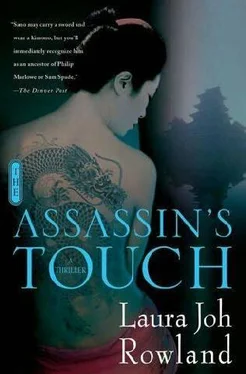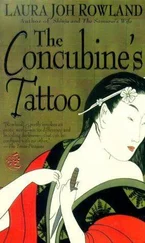“What, are you trying to correct your mistake by going over the same ground where you slipped up?” Hirata said.
Hoshina scowled. “There’s nothing to see in there,” he insisted, which convinced Hirata that the bathhouse contained important clues. Hirata and his men kept walking. Hoshina followed them into the bathhouse. Inside a vestibule, a woman dressed in a gray and white floral kimono knelt on a platform. Racks on the walls contained towels and cloth bags of rice-bran soap.
“Good day, masters,” she said, bowing to Hirata and the detectives. She looked to be in her fifties, stooped and slight, her hair dyed an unnatural shade of black, her face heavily powdered and rouged. But her eyes were bright, her features still pretty. When she saw Hoshina, her smile faded. “Back again so soon? Haven’t you caused enough trouble here already?”
She was the type of older woman who spoke her mind, even to male social superiors, who were probably intimidated because she reminded them of their strict mothers or childhood nursemaids. Now, as Hoshina glowered, she said to Hirata, “Welcome to my establishment. You and your men can undress in there.” She pointed to an adjacent room behind a curtain, where dressing gowns hung on hooks, clothes were folded into compartments on the wall, and shoes stood on racks.
“Thank you, but we don’t want a bath.” Hirata introduced himself, then said, “We’re here to investigate the death of one of your customers-Treasury Minister Moriwaki.”
The proprietress flicked her shrewd gaze from Hirata to Hoshina. “I’m glad somebody else has taken charge. How may I help you?”
“You can show me where the treasury minister died.”
“Come right this way.” Stepping off the platform, she smiled at Hirata and cut her eyes at Hoshina.
Hirata and his men followed her through a curtained doorway and along a corridor. Steamy air and splashing noises issued from chambers divided by lattice-and-paper partitions. Each contained a large, square sunken tub surrounded by a raised floor made of wooden slats. Naked men soaked in the tubs or crouched beside them. Female attendants scrubbed backs, poured buckets of water over the men, or sat naked beside them in the tubs. Some of the doors were closed; from these issued giggles and moans. Hirata knew that bathhouse prostitution was illegal but common, and the proprietress surely must pay the police to let her operate outside the law.
She opened a partition. “This is it.” The tub was empty, the floor dry. She stepped inside and opened the bamboo blinds. Dust motes glistened in the sunshine. “We haven’t used this room since Moriwaki-san died. None of the girls will work in here. They think it’s haunted by his ghost.”
“Were you on the premises when he died?” Hirata asked.
“Yes. I told him what happened.” The proprietress cast a baleful look at Hoshina. “But he wouldn’t listen.”
Hoshina slouched against the wall, his hands in his armpits, his expression stormy. But Hirata knew he’d stick around to see if Hirata would turn up something he’d missed, which he could use to get back in Lord Matsudaira’s good graces. He was the sort of man who would rather take credit for someone else’s work than take pains to do his job right in the first place.
“I’ll listen,” Hirata said. “Tell me.”
“I was out front when Moriwaki came for his bath,” the woman explained. “He was a regular customer. Came in almost every day. I called Yuki to wait on him. She was his favorite girl. She brought him in here. After a while, I heard a loud crash. Yuki screamed. I ran to see what was wrong. I found Moriwaki-sanlying there, naked.” She pointed at the floor beside the tub. “Yuki said he’d fallen down. His head was bloody where it had hit the floor.”
She pursed her lips. “First time a customer ever died here. Very bad for business. But it was an accident.”
Hirata observed that this sounded just like Chief Ejima, suddenly dropping dead for no clear-cut reason. Had the treasury minister been another victim of dim-mak?
“I sent a message to Moriwaki’s family. His retainers came and told Yuki and me not to worry; they didn’t blame us. They took his body home. But the next day, he showed up.” She shot a bitter glance at Hoshina. “He took Yuki into a room and asked her what had happened to Moriwaki. When she tried to tell him she hadn’t done anything wrong, he called her a liar. I heard him hitting her. I heard her crying.”
“That’s enough,” Hoshina interrupted angrily.
“Go on,” Hirata said.
The woman gave Hoshina a vindictive smirk. “He thought Yuki had pushed Moriwaki. He made her say so. He arrested her and took her to jail, even though I told him Yuki was a good girl who’d never hurt a fly. Next day, her head was cut off.”
Hirata regarded the police commissioner with disgust. “That was good, quick detective work.”
Nettled, Hoshina hurried to justify himself. “It was standard procedure.” Torture of suspects was legal and often used to obtain confessions. The disadvantage was that it tended to produce as many false confessions as true ones.
“And today he comes back,” the woman said. “It’s plain to see that he’s found out that Yuki didn’t kill the treasury minister, because he’s poking around again, looking for some other innocent person to blame.”
“Shut up, old woman!” Hoshina said, goaded to a rage. “I’ll close down your bathhouse, or-”
Fists clenched, he advanced on her. Hirata’s detectives pushed him away. Hirata said, “This woman is an important witness, and if you do anything to hurt her, you’ll be in more trouble than you already are.”
Hoshina subsided, impotent but seething. Hirata took a petty pleasure in making Hoshina pay for insulting him today and sabotaging Sano in the past. He addressed the woman: “I intend to see that the real killer is caught. I need to ask you some questions about Treasury Minister Moriwaki.”
Smug under his protection, the woman said, “Go right ahead.”
“Did Moriwaki have any unusual bruises that you saw?”
“As a matter of fact, he did.”
Hoshina spoke through gritted teeth: “I ordered you to keep quiet about everything pertaining to this investigation.”
“I can’t refuse to talk to the shogun’s detective, can I?” The woman feigned helpless innocence. She told Hirata, “He had a bruise right here,” and pointed to a spot near her temple.
Hirata felt a ripple of excitement. “What did it look like?”
“It was blue. Oval-shaped. Kind of like a fingerprint.”
At last Hirata had definite evidence that connected one of the previous murders to Chief Ejima’s. Hoshina looked displeased; obviously, he’d wanted to hoard this important fact for his own use.
“When did you see the bruise?” Hirata said.
“Right after Moriwaki died. I washed the blood off him before his retainers took him home.” She added, “Whenever I bathed him, he would suckle on my breasts while we sat in the tub. Some men his age like to do that, you know. I’d spent so much time looking down at his head that I couldn’t help but notice the bruise because it hadn’t been there before.”
That was more detail than Hirata needed, but it added veracity to her statement. “You said the treasury minister was a regular customer. Had he come here during the two days previous to his death?”
Hoshina made angry, shushing gestures. The woman ignored him. “As a matter of fact, he was here just the day before.”
Now Hirata could account tor some of the time Moriwaki had spent away from Edo Castle. “Did you see anyone with him that day?”
“I already asked her that,” Hoshina interrupted. “She doesn’t know anything. She’s inventing lies to please you.”
Читать дальше












